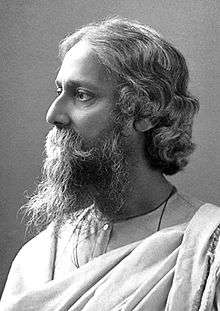Bharot Bhagyo Bidhata
Bhārat Bhāgya Vidhātā (Bengali: ভারতভাগ্যবিধাতা, Dispenser of the destiny of India) is a five-stanza Brahmo hymn in Bengali language [1] dedicated to Supreme divine God or Para brahman who is the dispenser of the destiny of India. It was composed and scored in a highly Sanskritized Bengali by Nobel laureate Rabindranath Tagore in 1911. The first stanza of the song has been adopted as the National Anthem of India.[2][3][4]
Lyrics of all 5 stanzas
The English translation below has been adapted from an unverifiable source.[5]
| Bengali Romanization | English Translation | |
|---|---|---|
Jono gono mono odhinayoko joyo he |
Oh! the ruler of the minds of people, Victory be to You, |
Apart from the above translation which follows the original very closely, Tagore's own interpretation of Jana Gana Mana in English is available as ![]() The Morning Song of India. Wikisource..
The Morning Song of India. Wikisource..
See also
- Jana Gana Mana (The National Anthem of India)
- Rabindranath Tagore
- Vande Mataram-The National Song of India
- Bankim Chandra Chattopadhyay
- Jana Gana Mana Video
- An earlier poem by Tagore (Amar Shonar Bangla) was later selected as the national anthem of Bangladesh.
- Chitto Jetha Bhayshunyo ("Where the Mind is Without Fear...Into that heaven of freedom, Let my country awake!") -a patriotic poem from Gitanjali by Rabindranath Tagore
- Ekla Chalo Re- A poem by Rabindranath Tagore and publicised by 'Netaji' Subhas Chandra Bose
- Indian National Pledge by Pydimarri Venkata Subba Rao
Notes
- ↑ http://www.ibnlive.com/news/movies/bharat-bhagya-bidhata-from-rajkahini-is-a-tagore-song-and-not-an-extended-version-of-the-national-anthem-1108614.html IBNLive.com The original Tagore song - "Not a single note of the original Rabindranath Tagore composition has been altered"
- ↑ Bhattacharya, Sabyasachi (2011). Rabindranath Tagore : an interpretation. New Delhi: Viking, Penguin Books India. p. 206. ISBN 978-0670084555.
Incidentally a myth regarding this song needs to be refuted and laid to rest. It is on record that the song was written on 11 December 1911. On December 12, 1911 the Delhi Durbar met to honour King Emperor George V. Obviously a poem written on 11 December could not be intended for an event the following day. The song was actually sung at the twenty-seventh session of the Indian National Congress, Calcutta on 28 December 1911 as the opening song at the beginning of the day’s proceedings. Thereafter it was also sung at the foundation day anniversary of Adi Brahma Samaj in February 1912 and included in their collection of psalms, Brahma Sangit.
- ↑ http://satyashodh.com/janaganaman/
- ↑ National Anthem – National Symbols – Know India. Nation Portal of Government of India.
- ↑ "All 5 stanzas of Jana Gana Mana with Bengali script".
References
- Dutta, K; Robinson, A (1995), Rabindranath Tagore: The Myriad-Minded Man, St. Martin's Press, ISBN 0-312-14030-4
- Sekhar Mittra; Sitansu (2001), Bengal's Renaissance, Academic Publishers, Kolkata, ISBN 81-87504-18-8
External links
| Wikimedia Commons has media related to Jana Gana Mana (hymn). |
- National Anthem – Know India. National Portal of India. Government of India. (Also contains the official version of the Indian National Anthem in mp3 format)
- YOUTUBE video of Bharoto Bhagyo Bidhata, The original Tagore song - "Not a single note of the original Rabindranath Tagore composition has been altered"
- The Morning Song of India

